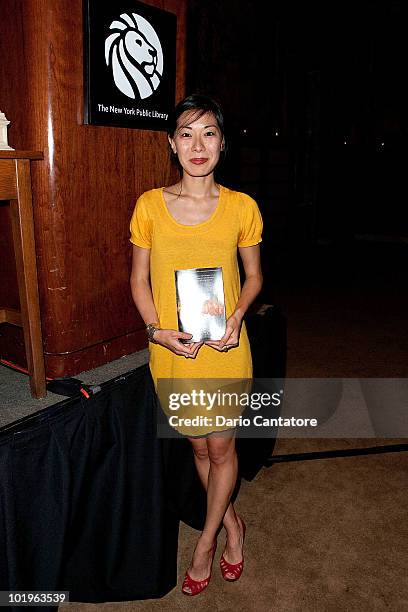Katie Kitamura, the acclaimed author known for her deep explorations of the human condition, has captivated readers with her latest novel, “Audition.” Scheduled to be discussed at Harvard’s Mahindra Humanities Center, this work exemplifies Kitamura’s mastery in weaving themes of performance and secrecy, skills honed during her time as a Guggenheim Fellow in fiction. With a backdrop steeped in horror genre literature, Kitamura delves into the uncanny experiences of her characters, often mirroring the performative aspects of daily life. In a recent Katie Kitamura interview, she highlighted how her novels often reflect unsettling truths about family dynamics, making them all the more resonant in today’s world. As she navigates the complexities of contemporary life, her insights promise an engaging conversation at Harvard about the often-hidden fears that shape our identities.
In the world of contemporary literature, Katie Kitamura stands out for her ability to blur the lines between fiction and reality, setting the stage for intriguing discussions around her latest release, “Audition.” This novel marks another chapter in her exploration of nuanced relationships and the hidden lives we lead, echoing sentiments often found in horror narratives. Simultaneously recognized as a Guggenheim Fellow for 2025, Kitamura’s latest works invite readers to delve into the psychological complexity of her characters, where the familiar transforms into the eerie. During her upcoming dialogue at Harvard, themes of performance and the essence of identity will be front and center, reflecting on how literature serves as a mirror to societal truths. Kitamura’s writings not only challenge conventional storytelling but also provoke thought about our own lives and the performances we present in our daily interactions.
Exploring the Theme of Horror in Katie Kitamura’s ‘Audition’
Katie Kitamura’s latest novel, “Audition,” delves deeply into the realm of horror, blending the intricacies of middle-aged life with unsettling themes. This psychological exploration brings forth a chilling narrative reflecting the uncanny aspects of reality, where personal identities and familial roles blur. Drawing inspiration from classic horror works like Ira Levin’s “Rosemary’s Baby,” Kitamura utilizes settings that evoke claustrophobia and unease, allowing characters to confront their most daunting fears. By intertwining the everyday with the eerie, Kitamura crafts a tale that resonates with readers familiar with the subtle horrors lurking in their own lives.
The novel’s horror elements emerge not only through the external threats but also through internal conflicts as the characters grapple with their concealments—a hallmark of post-modern horror. As the protagonist navigates her existence within a seemingly ordinary New York apartment, unsettling truths about her family emerge. This duality of perception prompts readers to question their understanding of secrecy and identity within intimate relationships, evoking that haunting sensation of familiarity turning strange. Thus, “Audition” challenges conventional horror narratives, tapping into fears that are both psychological and deeply personal.
The Influence of Pandemic Themes on Kitamura’s Writing
In an unexpected twist, Kitamura’s “Audition” indirectly mirrors a pandemic narrative, despite not explicitly referencing masks or social distancing. Written during the global crisis, the novel captures the tensions and dynamics within confined spaces—a metaphor for the emotional whirring families faced during lockdowns. The intimate setting of a New York apartment becomes a microcosm for exploring deeper existential anxieties and the impact of familial cohabitation during uncertain times. Kitamura’s inability to escape the pervasive air of the pandemic illustrates how external environments inevitably shape creative expression.
This thematic resonance with the pandemic experience speaks volumes to the power of literature in reflecting societal moods. Readers may find themselves relating to the strife of the characters, paralleling their experiences with isolation, conflict, and the quest for personal space during unprecedented global challenges. Kitamura’s work reflects a world grappling with reality, as each moment penned transcribes a narrative that encapsulates both fear and resilience, reinforcing the idea that literature serves as a mirror to our lived experiences in trying times.
Performance and Identity in Katie Kitamura’s Novels
Katie Kitamura’s exploration of performance is a recurring motif throughout her works, particularly in “Audition.” The protagonist, an actor, navigates the complexities of identity by embodying various roles in her personal and professional life. Kitamura cleverly reflects on how our societal contexts demand we perform certain personas, often creating a disconnect from our authentic selves. This heightened awareness of performance draws readers into a contemplative space regarding their own experiences with identity—how we present ourselves to others and the masks we wear in social situations.
Through her narrative, Kitamura instigates a critical dialogue about intimacy and exposure within relationships. As characters grapple with the essence of their performances, the tension between authenticity and façade creates an emotionally charged atmosphere. The text encourages readers to ponder the nuances of privacy and the boundaries of self-disclosure in partnerships. By dissecting the mechanics of performance, Kitamura reveals a deeper understanding of human connection, suggesting that true intimacy lies in the acceptance of life’s inherent complexities.
The Role of Language and Fiction in Current Times
In a world where language plays an increasingly vital role, Katie Kitamura’s advocacy for fiction and eloquent use of language resonate profoundly. Addressing her students at New York University, she emphasizes the importance of writing as a medium for expression and change amidst political upheaval. With literature facing censorship and books being banned, Kitamura asserts that the power of the written word remains a formidable force against manipulation and division. Through fiction, writers can construct narratives that inspire visions of alternative realities, prompting readers to engage with their environments critically.
Moreover, Kitamura underlines that stories enable connections between individuals, fostering understanding and empathy. By sharing narratives, readers gain insights into diverse perspectives, essential for nurturing communal ties in fragmented societies. This belief in the medium’s potential amplifies her commitment to the craft—she sees writing not merely as art, but as a necessary practice for fostering awareness and resistance against prevailing norms. In this context, Kitamura’s work becomes a lighthouse guiding readers toward a more unified existence through storytelling.
Understanding ‘Audition’ Through the Lens of the Horror Genre
As Katie Kitamura re-enters the realm of horror in her latest novel “Audition,” she places her unique narrative style within a genre often marked by external threats and supernatural elements. However, unlike traditional horror narratives, Kitamura’s approach is subtle yet profound, employing the internal psychological fears of her characters to establish a poignant atmosphere of dread. The eerie undertones of domestic life reveal that the true horrors may lie beneath the surface of daily interactions and relationships, rather than the external world.
Additionally, this interplay between horror and reality serves as a critique of societal expectations surrounding motherhood and identity. As Kitamura invites readers into the unsettling emotions tied to familial dynamics, she poses a crucial question of reality: What happens when the safe spaces we know become prisons of our own making? By intertwining the essence of horror with explorations of self, Kitamura’s “Audition” challenges readers to confront their assumptions, exploring the macabre potential of normalcy and the existential fears that dwell within.
Katie Kitamura’s Contribution to the Humanities through Literature
Katie Kitamura’s impact extends beyond her novels into the broader humanities landscape, particularly through her teaching role at institutions like New York University. Here, she champions the exploration of English and literature as vital tools for critical thinking and social engagement. Her belief that literature continues to hold substantial power, especially in turbulent times, inspires new generations of writers to harness their voices for change. Kitamura’s pedagogy emphasizes the importance of understanding narrative techniques, fostering creativity, and encouraging students to articulate their perspectives effectively.
Moreover, her recent appointment as a Guggenheim Fellow speaks volumes about her contributions to fiction and literary discourse. Kitamura’s ability to traverse complex themes—ranging from identity to performance—establishes her as a significant figure in contemporary literature. She not only illuminates the richness of language but also underscores the transformative nature of stories, making a compelling case for their relevance in today’s socio-political climate. Through her novels and academic engagement, Katie Kitamura continues to champion the exploration of what it means to be human in a rapidly changing world.
The Interplay Between Art and Literature in Kitamura’s Driven Narratives
Katie Kitamura’s narratives are often imbued with a strong sense of artistic influence, reflecting her passion for visual arts alongside her literary pursuits. In “Audition,” this interplay enriches the storytelling, as characters experience their lives through an artistic lens. Kitamura’s insightful observations about aesthetics and human interaction elevate her exploration of performance, enabling readers to appreciate the subtle connections between art and the life experiences of her characters. This encapsulation of artistic depth within prose invites readers to examine their own interpretations of beauty and meaning in everyday existences.
Further, Kitamura’s acknowledgment of the art world suggests a broader cultural engagement within her writing. By weaving artistic elements into her narratives, she emphasizes how creativity shapes personal perception and societal roles. This synthesis of arts and literature serves as an invitation for audiences to consider the myriad of influences that mold their realities, pointing to the significance of embracing diverse expressions of humanity. In doing so, Kitamura not only entertains but also cultivates an enriched appreciation for the world around us.
Inner Conflicts and the Essence of Privacy in Relationships
At the heart of Katie Kitamura’s work, especially in “Audition,” lies an exploration of the delicate balance between privacy and intimacy in relationships. Through the lens of her characters, Kitamura poses critical questions about the fabric of human connections: how much do we truly know about those closest to us? As the protagonist grapples with the demands of motherhood, identity, and performance, her journey invites readers to reflect on the often unspoken boundaries that define our interactions. This nuanced portrayal of relationships resonates in a world where vulnerability and privacy are constantly at odds.
Kitamura’s assertion that complete disclosure may not only be unrealistic but also unhealthy prompts a broader examination of relational dynamics. The inherent complexities of our identities suggest that keeping certain facets of oneself hidden is not merely a protective measure but a natural aspect of human experience. In this way, Kitamura’s narratives strike a chord, enhancing our understanding of how to navigate the intricate web of intimacy while honoring the essential parts of ourselves that we choose to guard. Her work thus champions the rightful place of privacy as an element of healthy relationships.
The Psychological Depth of Characterization in ‘Audition’
Delving into psychological complexity, Katie Kitamura’s characterization in “Audition” reveals the multi-dimensionality of human experiences. The central character is not simply a vessel through which horror unfolds but a nuanced individual navigating the treacherous waters of identity, secrecy, and familial expectation. Kitamura skillfully maps out the inner lives of her characters, drawing readers into their fears and uncertainties. By tapping into these psychological depths, she crafts a narrative that invites empathy while maintaining an air of unsettling familiarity.
This intricate portrayal of characters extends beyond conventional storytelling, enhancing the reader’s investment in their journeys. Kitamura allows her audience to witness not only the characters’ external conflicts but also their internal struggles. The fears lurking within their minds become the core of the novel’s horror—questions about motherhood, the validity of relationships, and the dread of losing one’s sense of self. Thus, Kitamura’s attention to psychological detail enriches the reader’s experience, creating a compelling narrative that resonates on multiple levels.
Frequently Asked Questions
What themes are explored in Katie Kitamura’s novel ‘Audition’?
In ‘Audition’, Katie Kitamura explores themes of performance, privacy, and the unsettling aspects of midlife. The narrative delves into the uncanny dynamics of a family living in a New York City apartment, emphasizing the complexities of motherhood, identity, and the hidden truths that can disrupt our perceptions of those we think we know.
How does Katie Kitamura’s latest book reflect the horror genre?
Katie Kitamura’s ‘Audition’ incorporates elements of the horror genre by examining the fear and uncertainty inherent in domestic life. Inspired by works like ‘Rosemary’s Baby’, Kitamura evokes feelings of dread through uncanny moments that challenge the characters’ understanding of their own lives, making the familiar feel terrifyingly strange.
What impact did the pandemic have on Katie Kitamura’s writing of ‘Audition’?
While ‘Audition’ does not explicitly mention the pandemic, Katie Kitamura wrote it during this period, which influenced its atmosphere. The novel’s portrayal of confined spaces and family tensions resonates with themes of isolation and familial stress, inadvertently reflecting the pandemic experience, even if not directly acknowledged in the text.
What is significant about the title ‘Audition’ in Katie Kitamura’s novel?
The title ‘Audition’ holds significance as it reflects the central character’s profession as an actor, highlighting themes of performance and identity. Katie Kitamura uses this concept to explore how roles shape our interactions and the inevitable reveal of deeper truths as characters navigate their lives off-stage.
Why is Katie Kitamura considered a significant voice in contemporary literature?
Katie Kitamura is recognized as a significant voice in contemporary literature due to her ability to seamlessly blend genres, including elements of horror and psychological depth in her works. Her insights into human relationships and the intricacies of performance resonate widely, making her recent recognition as a 2025 Guggenheim Fellow in fiction a testament to her impact.
What insights does Katie Kitamura offer about the role of fiction in society?
Katie Kitamura emphasizes the critical role of fiction in society, especially during challenging times. She argues that fiction enables us to imagine alternative realities and encourages meaningful connections among individuals. Kitamura believes that literature can be a powerful tool against oppression, as it fosters understanding and empathy in an increasingly divided world.
What is Katie Kitamura’s relationship with the Harvard Humanities Center?
Katie Kitamura is set to participate in an event at the Mahindra Humanities Center at Harvard, where she will engage in conversation about her work and the themes present in her novels. This collaboration underscores her stature in the literary community and her contributions to discussions surrounding literature and culture.
How does Katie Kitamura address the concept of privacy in her novels?
In her novels, including ‘Audition’, Katie Kitamura addresses the concept of privacy by exploring the boundaries of self-disclosure in relationships. She suggests that meaningful connections can exist alongside a necessary degree of privacy, challenging the notion of total transparency in familial and intimate bonds.
| Key Point | Details |
|---|---|
| Upcoming event | Katie Kitamura will be in conversation with Claire Messud at Harvard’s Mahindra Humanities Center. |
| New Novel: ‘Audition’ | Kitamura’s latest novel explores themes of horror, uncertainty, and personal relationships in a confined space. |
| Inspiration and Themes | The novel draws parallels to ‘Rosemary’s Baby’, focusing on troubled motherhood and the uncanny within familiar settings. |
| Genre Exploration | Kitamura considers her work within the realms of mystery, courtroom drama, and horror to explore deeper human fears. |
| Background | Kitamura was named a 2025 Guggenheim Fellow and lives in Brooklyn with her husband, Hari Kunzru. |
| On Writing | In the current sociopolitical climate, Kitamura emphasizes the importance of fiction and language as tools for connection and understanding. |
Summary
Katie Kitamura’s exploration of horror in her latest novel ‘Audition’ reveals significant insights into the human psyche and the dynamics of personal relationships. As she discusses her work and its themes during her visit to Harvard, it becomes clear that Kitamura understands the subtle interplay between performance and authenticity in our lives. Her advocacy for the value of literature, especially in challenging times, marks her as a vital voice in contemporary fiction, underscoring the necessity for imaginative storytelling in shaping our realities.



